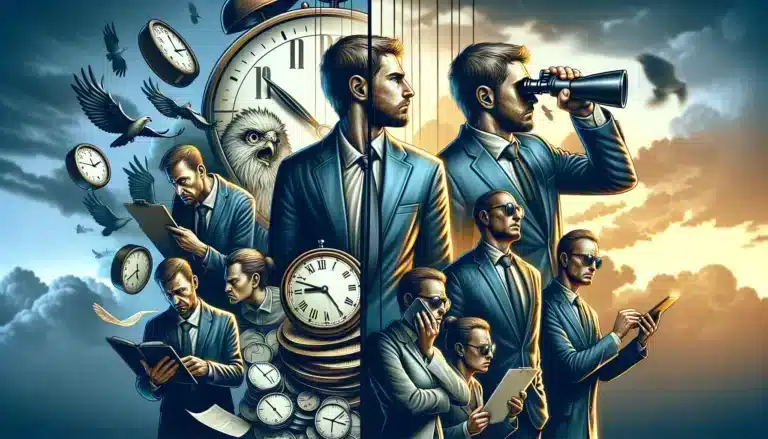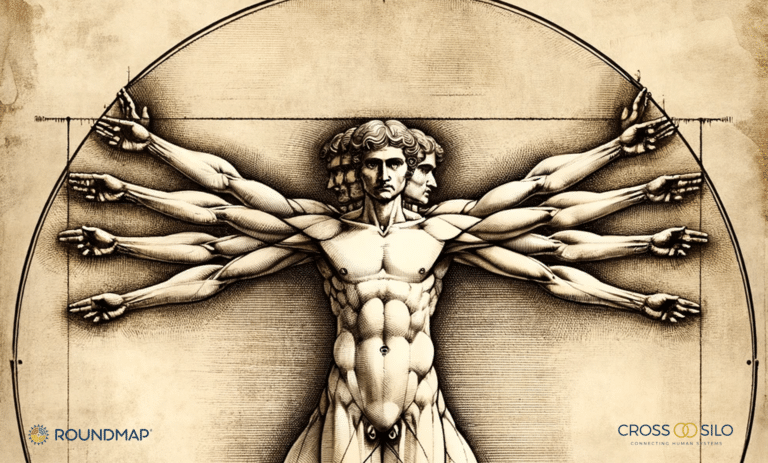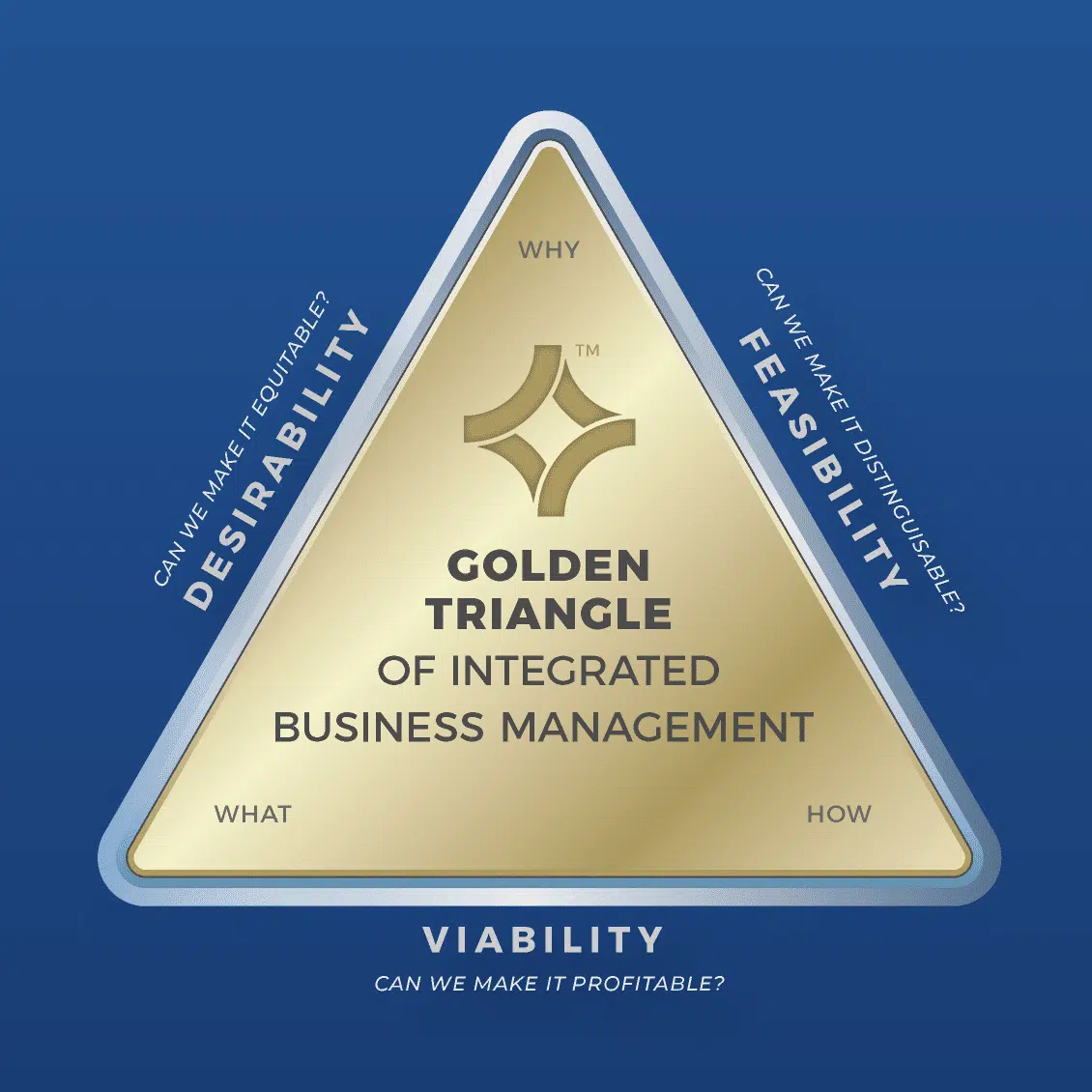─ Leading Across Divides ─
Our world’s increasing complexity makes commercial outcomes harder to predict. When revenue stagnates or declines, the imperative to explore new opportunities through collaborative innovation becomes apparent.
To bridge the organizational divides, we’re deploying several methods and techniques, tied to our proprietary framework, RoundMap®. We have successfully guided organizations from isolation to integration. Our integrated approach fosters stronger connections, greater resilience, and increased innovation, leading to new opportunities for growth and a brighter future.
Please consider our professional services and feel free to reach out to discuss your firm’s bespoke challenges.
Our Clients and Partners
Canon USA: Crossing Functional Silos to Create One Marketing Center of Excellence
KERN: Create Opportunities to Bring More Innovative Ideas to Corporate Clients
Working with the Originators of Positive Change at a Positive Inquiry Summit
From Isolation to Integration
What has the most detrimental impact on a firm’s performance, particularly in innovation and customer experience?
CROSS/SILO was founded by Edwin Korver in 2016 to put a decade-long study into practice of the dynamics determining a firm’s operational and commercial success ─ in an age of rapid breakthroughs and early breakdowns.
He found that one of the root causes of weak performance is a lack of cross-boundary collaboration. This hampers a firm’s ability to innovate meaningfully or deliver coherent, seamless, unsurpassable, and highly personalized customer experiences that are desired and expected by most customers today.
Usually, when growth starts to decline, executives look for new growth opportunities rather than to fix the silo syndrome. However, if the silo problem persists, the outcome of any substitute endeavor will most likely be as disappointing.
In her book, ‘The Silo Effect,’ Financial Times journalist Gillian Tett exposed how siloed teams severely crippled organizations such as SONY, Bank of England, New York City, and UBS.
Tett commented on her book: “Sony, when it started as a company, had a common sense of purpose. But as it grew big, it became successful. And success has a terrible curse. It doesn’t just breathe complacency; it ignites territorial behavior. One by one the different products created silos. Bureaucracies sprung up, in which each department was incentivized to defend its products, ideas, and brilliance.”
Indeed, Sony’s failure to launch a unified digital successor to the popular analog Walkman® was a significant misstep. Instead, each division independently developed its own incompatible version, leading to consumer confusion. This forced Sony to withdraw all versions, paving the way for Apple’s iPod.
Our mission is to champion cross-boundary collaboration, enhancing the firm’s readiness for change and capacity for innovation. This approach will significantly elevate its potential to deliver meaningful value and thrive in our increasingly complex world.
“The task of leadership is to create an alignment of strengths in ways that make a system’s weaknesses irrelevant.”
Peter Drucker, management consultant, educator, and best-selling author.
Navigating Complexity
How can you make complex decisions in today’s intricate and multifaceted business landscape?
Faced with today’s growing complexities in the business world, we badly need an integrated theory to decide on complex issues. As Bechtel suggests, if we don’t ‘help people to develop a subtle feeling of what is feasible,’ they can’t suppress an otherwise obsession with planning, market research, and management systems.
Fortunately, the Greek philosopher Aristotle provided us with such a theory many centuries ago, known as the Nicomachean Ethics; it is a practical guide toward applying ethics to any complex situation. Founded on Aristotle’s remarkable body of work, we created the Grandmaster’s Playbook.
Prioritizing Horizontal Collaboration
Which relationships are most important for driving innovation, increasing customer loyalty, and achieving higher profit margins?
Harvard’s Heidi Gardner has found that firms with more cross-boundary collaboration achieve greater customer loyalty and higher margins: “As innovation hinges more and more on interdisciplinary cooperation, digitalization transforms business at a breakneck pace, and globalization increasingly requires people to work across national borders, the demand for executives who can lead projects at interfaces keeps rising.”
When asked, professionals prioritize horizontal relationships. Today the vast majority of innovation and business-development opportunities lie in the interfaces between functions, offices, or organizations.
In short, the integrated solutions and seamless customer experiences that most customers want, but companies wrestle with developing and delivering require horizontal collaboration (across the functional silos). Hence our name, CROSS/SILO.
“Digital used to be about coding and IT. Now it’s
becoming a people business.”
Mary Kate Loftus, Senior Vice President, Director of Digital Banking at M&T Bank
The Human Factor
How can organizations effectively drive human-centered organizational transformation and catalyze business growth in an era of paramount digital advancement, where the potential for success and growth is unprecedented?
Prophet’s global research reveals the specific and most fundamental actions leaders like yourselves must take to drive the human aspects of organizational transformation and to catalyze business growth in the Digital Age: “Digital evolution is never that smooth because organizations so often overlook the need to take a strategic approach to cultural change; otherwise, as it has been said, you get the culture you deserve.” Prophet’s global research found that strategy and technology alone aren’t enough to drive transformation.
Prophet’s findings bolster the fact that organizational culture and the employee experience play vital roles in shaping progress. As a result, the human factors in digital transformation have become prominent. No matter how digital they may be, all organizations are human: “Any digital initiative requires a combination of business, process, and tech knowledge. Because digital requires these people to work together, collaboration is happening across business lines, not clusters.”
Prophet also suggests that: “Even with a holistic approach, aligning new behaviors, new skills, and new processes also require new ways of making decisions. And this is – to put it plainly – extremely hard without a team devoted to addressing that challenge head-on. We believe a team must actively manage and align those efforts. Otherwise, there will be no change and no true transformation. And in our experience, this team cannot live within the rules of the existing organizational structure.”
While Prophet proposes a project-based Transformation Management Office (TMO), we’re suggesting a systemic approach: the appointment of a polymatic Grandmaster of Business (GoB); be it a Chief of Staff or a GoB-headed office depends on the scale of the operation.
Obviously, we support Prophet’s demand for a holistic approach toward cultural and business transformation, given our creation (2016-2020) of RoundMap™ and the Grandmaster’s Playbook.
“Every successful organization has to make the transition from a world defined primarily by repetition to one primarily defined by change. This is the biggest transformation in the structure of how humans work together since the Agricultural Revolution.”
Tim O’Reilly, publisher, author and venture capitalist
Latest News

Mapping the Future: We’re Writing the Book on RoundMap®
At Cross/Silo, we believe the future of business lies in wholeness, not fragmentation. For too long, organizations have been shaped by linear thinking, short-term gains, and siloed operations. It’s time for a new narrative—one that embraces interconnectedness, adaptability, and shared value creation. That’s why we’ve embarked on writing a book

Versatility Unleashed: Unlocking Human Potential
In times of complexity and unpredictability, versatility is crucial for a company for several key reasons: Adaptability to Change: Versatile companies can quickly adapt to changing market conditions, technologies, and customer needs. This agility enables them to pivot strategies, products, and services in response to unforeseen challenges and opportunities. Resilience:

Navigating Complexity: The Versatility Matrix for Strategic Alignment
The RoundMap Versatility Matrix is a strategic tool designed to help leaders navigate the complexities of modern business environments. It provides a framework for understanding how different organizational approaches can be optimized depending on the prevailing market conditions. The matrix categorizes organizations into four quadrants, each representing a unique combination

Breaking Down Silos in Healthcare: The Critical Need for Cross-Disciplinary Collaboration
In today’s healthcare landscape, the prevalence of complex, chronic diseases is on the rise, presenting a daunting challenge for medical professionals and patients alike. As individuals often battle multiple health conditions simultaneously, the necessity for a cohesive, integrated approach to healthcare has never been more apparent. However, the persistent siloization

